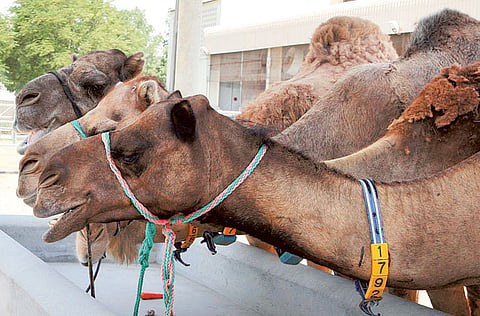Camel milk gains popularity internationally
American authority to use Dubai-based company as a benchmark in producing it in bulk

Dubai: A camel milk producer in Dubai predicts a surge in demand for camel milk internationally following a request from the food authorities in the US to use the strategy of a Dubai-based company as a benchmark in producing camel milk in bulk. The US request is a result of growing demand for camel milk in the US.
As the camel dairy industry has only been established in the past decade and is still in an early stage of development, information on camel milk quality worldwide continues to be scarce.
The Food and Drug Administration (FDA) in the US was initially notified about the process used at the Emirates Industry for Camel Milk and Products (EICMP) — the world’s first commercial producer of camel milk — which owns the Camelicious brand, after one of its researchers published an article in the September issue of the Journal of Dairy Science.
”The future implication of this and other relevant studies is to set benchmark quality values for camel milk, increase consumer confidence and awareness,” said Dr Peter Nagy, veterinary doctor and farm manager at EICMP.
Following dairy cattle, water buffalo, goats and sheep, camels are the fifth most important dairy animals in the world.
Speaking to Gulf News, Dr Nagy explained that such studies help to create further opportunities for camel milk producers to apply for export licences more easily.
“The research results in the long run will open the doors to camel milk producers to enter new markets and thus foster the further development of a strong and sustainable camel milk industry in the Middle East and globally,” he said.
The study, which was verified by a peer review process, was carried out by an international panel of scientists led by Dr Nagy, and is the first comprehensive report on the long-term monitoring of somatic cell count and microbiological quality in bulk tank milk of dromedary (Arabian) camels.
Due to the comprehensive approach of the research, the study delivered a reliable and scientifically proven quality reference for camel milk and its results will serve as a benchmark to develop quality standards and regulations for the camel milk industry in the future. Solid scientific findings such as this work will enable regulatory bodies to include camels in the recognised listings of milk-producing animals — making camel milk a listed consumer good.
The study has already received a positive reaction from the National Conference on Interstate Milk Shipment (NCIMS) in the US, and this organisation is responsible for the implementation of milk quality regulations (Grade “A” Pasteurised Milk Ordinance) set by the FDA.
“Through this scientific study, our research provided new data that is likely to be used by the regulatory agencies in the US or other major economic blocs to control food safety issues and protect consumer health related to camel milk products,” added Dr Nagy.


